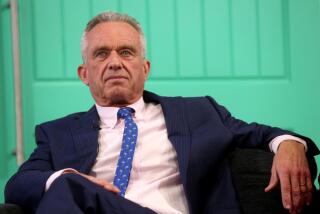Frank Mankiewicz dies at 90; Democratic insider was RFK aide, led NPR
Frank Mankiewicz, the son of a Hollywood legend who made his mark in the grittier worlds of Democratic politics and broadcast media, serving as press secretary to Sen. Robert F. Kennedy, presidential campaign manager for Sen. George S. McGovern and chief of National Public Radio during its bumpy rise to prominence, died Thursday at a hospital in Washington, D.C. He was 90.
NBC News correspondent Josh Mankiewicz said his father had been hospitalized with lung problems and died of heart failure.
Mankiewicz was the son of Herman J. Mankiewicz, the Oscar-winning screenwriter behind “Citizen Kane,” and nephew of Joseph L. Mankiewicz, who wrote and directed “All About Eve.” Growing up in Beverly Hills, he shared the family table with luminaries such as F. Scott and Zelda Fitzgerald, the Marx Brothers, Greta Garbo and Orson Welles, but the conversation “was always about politics,” his son said. So it was no surprise that Frank was eventually drawn to it and became a consummate Washington insider.
“I know everyone in Washington, and half of them owe me something. The other half I owe,” he told People magazine in 1982.
Although he ran for office twice — once in California and later in Maryland, losing both times — his widest public exposure came in 1968, when he appeared before millions of television viewers as the grim-faced man delivering updates on the condition of Sen. Kennedy after he was shot by Sirhan Sirhan at the Ambassador Hotel in Los Angeles. And it was Mankiewicz who announced, at 2 a.m. on June 6, that the senator had died.
“I have a short announcement to read which I will read at this time. Sen. Robert Francis Kennedy died at 1:44 a.m. today, June 6, 1968. ... He was 42 years old,” Mankiewicz said.
Later he would describe his work for the Democrat from New York as “the shaping influence in my adult life.”
He went on to run McGovern’s disastrous campaign against President Richard M. Nixon, who later put Mankiewicz on his “enemies list.”
In the infamous Watergate tapes, Nixon is heard agreeing when Chief of Staff Alexander M. Haig Jr. calls Mankiewicz “a known revolutionary.” “Or course,” Nixon replied. “The McGovernites. The McGovernites …”
Years later, Mankiewicz, as vice chairman of the lobbying and public relations firm Hill & Knowlton, had an office in the Watergate complex.
Born in New York on May 16, 1924, he moved west with his family and graduated from Beverly Hills High School. He briefly attended Haverford College in Pennsylvania before joining the Army and fighting in Europe during World War II.
After the war, he earned a bachelor’s degree in political science from UCLA in 1947 and a master’s in journalism from Columbia University in 1948. He lost a race for the California Legislature in 1950 and freelanced for Newsweek and other publications until entering UC Berkeley’s Boalt Hall. He earned his law degree in 1955.
He joined an entertainment law firm in Los Angeles, representing movie stars such as James Mason and Steve McQueen, but found the work unsatisfying.
“My wife Holly and I decided that if I stayed with the firm, within 10 years we’d have this terrific house and a lot of money,” he recalled in People magazine, “but nobody would care if we had lived or died, except perhaps our mothers.”
In 1961, he left Los Angeles to head the Peace Corps in Peru. Three years later, he was the program’s Latin American director.
In 1966 he joined Sen. Robert Kennedy’s staff as press secretary, continuing in that role when Kennedy launched his presidential campaign.
He was helping the senator’s wife, Ethel, step off the platform after the candidate’s victory speech in the California primary when tragedy struck.
“She was at the time three months’ pregnant, although I don’t think anybody knew it, except the inside group,” Mankiewicz recalled 30 years later. “We helped her down. And then she said, ‘Go on,’ and we started to move off quickly to catch up. And that’s when we heard the shots.”
Four years later, Mankiewicz joined McGovern’s campaign. “I thought I’d hate myself if I didn’t do it,” he told People.
He later said he regretted not pushing McGovern hard enough to drop Sen. Thomas Eagleton from the ticket after Eagleton’s history of psychiatric problems was disclosed. “But I never apologize for that campaign,” Mankiewicz said in the People interview. “All we did was lose an election. We didn’t go to jail — none of us. No perjurers. No conspiracies to obstruct justice.”
The South Dakota liberal, who had won the Democratic nomination as a sharp critic of the Vietnam War, wound up winning only Massachusetts and the District of Columbia.
After Nixon resigned in disgrace in 1974, “I was delighted,” Mankiewicz told the Philadelphia Bulletin. “I think we should celebrate Aug. 9th as a day of national liberation every year.”
He wrote two books about Nixon: “Perfectly Clear: Nixon From Whittier to Watergate” (1973) and “U.S. v. Richard M. Nixon: The Final Crisis” (1974).
In 1977, after writing a column in the Washington Post and losing a bid for a Maryland congressional seat, Mankiewicz joined NPR, charged with raising the profile of what was then an obscure network of 200-plus publicly funded stations.
He was widely credited with broadening the network’s appeal during his six-year tenure with shows such as “Morning Edition,” more than doubling the number of listeners and attracting private sponsorships. But in 1983 the network was nearly knocked off the air by a $6-million deficit. Congress and the Corp. for Public Broadcasting said Mankiewicz was responsible for the financial debacle, and he resigned under pressure.
He often said that working for Robert Kennedy had brought his “longest pleasure and happiness.”
“I used to say — still do say — that I could win a Nobel Prize and be named chief justice of the Supreme Court and serve two good terms as the president, and they’d write in my obit, Frank Mankiewicz was an aide to Robert Kennedy,” he told the New York Times some years ago, “and they’d be right. And I’d accept that proudly.”
Mankiewicz’s first marriage, to Holly Jolley, ended in divorce. He is survived by their two sons, Josh and Ben, a host of Turner Classic Movies; his second wife, novelist Patricia O’Brien, whom he married in 1988; a brother, Don; four stepdaughters; a granddaughter; and four step-grandchildren.
-----------
For the Record
Oct. 26, 9:38 a.m.: An earlier version of this article named Frank Mankiewicz’s surviving brother as Donald; the brother’s name is Don.
-----------
Twitter: @ewooLATimes
More to Read
Start your day right
Sign up for Essential California for the L.A. Times biggest news, features and recommendations in your inbox six days a week.
You may occasionally receive promotional content from the Los Angeles Times.







